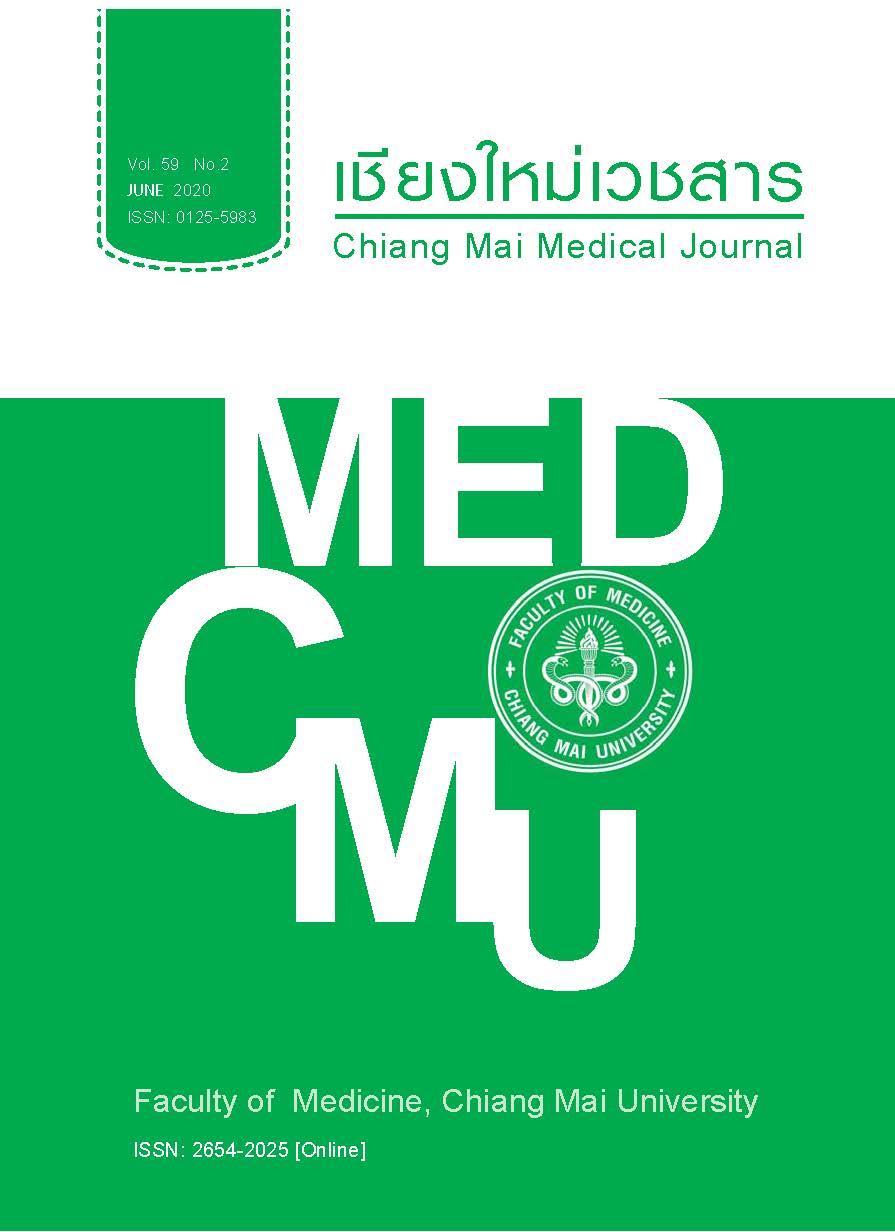Factors Associated with Improvement in the Severity of Major Depressive Disorder 5 to 11 Weeks after Initiating Treatment with Antidepressants
Keywords:
early remission, symptom improvement, major depressive disorder, MDDAbstract
Objectives To identify factors associated with symptom improvement in patients with major depressive disorder (MDD) at 5 to 11 weeks after initiating treatment with antidepressants. Methods This observational clinical research study was based on data from a retrospective chart review. The patient population included individuals treated at the outpatient unit of the Department of Psychiatry of Siriraj Hospital (Bangkok, Thailand) who had been diagnosed for the first time with MDD according to criteria in the Diagnostic & Statistical Manual of Mental Disorders, 5th edition either by a psychiatrist or by a psychiatric resident under the supervision of a psychiatrist. Patient symptom severity was evaluated at the first visit using the Thai version of the Mont- gomery and Asberg Depression Rating Scale (MADRS) and was reevaluated 5 to 11 weeks after initiation of treatment.
Results The mean age of the 114 patients was 37.56±16.131 years and the majority (n=84 or 73.7%) were female. Treatment with an adequate dose of an anti-depressant for an sufficient period of time (> 5 weeks) (OR, 15.344; 95% CI, 1.756-134.119; p = 0.014) was associated with early remission of symptoms. Anti-depressant use at an adequate dose and for a sufficient period of time (OR 9.224; 95% CI 1.786-47.632; p = 0.008) was associated with symptom response.
Conclusion Use of an appropriate anti-depressant for at least 5 weeks is associated with early remission of depressive symptoms. Titrating antidepressants to an adequate dose and encouraging patients to continue their use for an adequate period can help improve treatment outcomes including MADRS scores.
References
World Health Organization. Depression [Internet]. [cited 2017 Feb 24]. Available from: http://www.who.int/mediacentre/factsheets/fs369/en/
Gaynes BN, Warden D, Trivedi MH, Wisniewski SR, Fava M, Rush AJ. What did STAR*D teach us? Results from a large-scale, practical, clinical trial for patients with depression. Psychiatr Serv. 2009;60:1439–45.
Kongsuk T, Supanya S, Kenbubpha K, Phimtra S, Sukhawaha S, Leejongpermpoon J. Services for depres-sion and suicide in Thailand. WHO South East Asia J Public Health. 2017;6:34–8.
Rush A, Trivedi MH, Wisniewski SR, Nierenberg AA, Stewart JW, Warden D, et al. Acute and Longer-Term Outcomes in Depressed Outpatients Requiring One or Several Treatment Steps: A STAR*D Report. Am J Psychiatry. 2006;163:1905–17.
Zimmerman M, Posternak MA, Chelminski I. Deriva-tion of a definition of remission on the Montgomery-Asberg depression rating scale corresponding to the definition of remission on the Hamilton rating scale for depression. J Psychiatr Res. 2004;38:577–82.
McIntyre RS, Konarski JZ, Mancini DA, Fulton KA, Parikh S V., Grigoriadis S, et al. Measuring the severity of depression and remission in primary care: Validation of the HAMD-7 scale. CMAJ. 2005;173:1327–31.
Riedel M, Möller HJ, Obermeier M, Adli M, Bauer M, Kronmüller K, et al. Clinical predictors of response and remission in inpatients with depressive syndromes. J Affect Disord. 2011;133:137–49.
Katzelnick DJ, Duffy FF, Chung H, Regier DA, Rae DS, Trivedi MH. Depression outcomes in psychiatric clinical practice: Using a self-rated measure of depression se-verity. Psychiatr Serv. 2011;62:929–35.
Sakurai H, Uchida H, Abe T, Nakajima S, Suzuki T, Pollock BG, et al. Trajectories of individual symptoms in remitters versus non-remitters with depression. J Affect Disord. 2013;151:506–13.
Swindle RW, Cronkite RC, Moos RH. Risk factors for sustained nonremission of depressive symptoms: A 4- year follow-up. J Nerv Ment Dis. 1998;186:462–9.
S. Chunjam, S. Sangon TT. A Survey of Depression Research in Thailand. Ramathibodi Nurs J. 2011;17: 412–29.
Diagnostic and statistical manual of mental disorders. 5th ed. Washington, DC: American Psychiatric Associa-tion; 2013. p. 160-2.
Satthapisit S, Posayaanuwat N, Sasaluksananont C, Kaewpornsawan T, Singhakun S. The comparison of Montgomery and Asberg Depression Rating Scale (MADRS Thai) to Diagnostic and Statistical Manual of Mental Disorders (DSM) and to Hamilton Rating Scale for Depression (HRSD): Validity and reliability. J Med Assoc Thai. 2007;90:524–31.
Stahl S, Grady M, Muntner N. Stahl’s essential psychop-harmacology, 4th ed. New York: Cambridge University Press; 2013. p. 291-5.
Melfi CA, Chawla AJ, Croghan TW, Hanna MP, Kennedy S, Sredl K. The effects of adherence to antidepressant treatment guidelines on relapse and recurrence of depression. Arch Gen Psychiatry. 1998;55:1128–32.
Downloads
Published
How to Cite
Issue
Section
License

This work is licensed under a Creative Commons Attribution-NonCommercial-NoDerivatives 4.0 International License.










